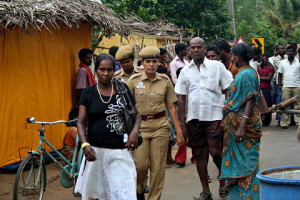 |
| Escorting Sri Lankan pilgrims on Sept. 3, 2012 in Thanjavur district of Tamil Nadu – AP photo |
Last week, while traveling down the coast of Tamil Nadu for my article about the fishing wars between India and Sri Lanka, I noticed pilgrims walking along the side of the road. They trudged along, despite the heat, as they walked kilometers on a pilgrimage to Christian shrines in the state of Tamil Nadu. What I had not realized is that some of the pilgrims visiting the state were from Sri Lanka.
That has become painfully clear this week. The same tensions coursing through the fishing dispute between India and Sri Lanka are now contributing to an ugly spectacle in Tamil Nadu as Indian protesters on Tuesday stoned buses carrying Sri Lankan pilgrims.
The Sri Lankan government issued a travel advisory and arranged for a special plane to transport pilgrims home. The attack followed earlier protests and prompted India’s Ministry of External Affairs to offer reassurances that Sri Lankans are safe in India.
From New Delhi, where foreign policy attention is usually focused on Pakistan and China, it is easy to forget that Sri Lanka remains a potent, explosive issue in Tamil Nadu, roughly three years after the Sri Lankan government defeated Tamil rebels to end of the bloody Sri Lankan civil war. Since then, officials in New Delhi have worked to maintain relations with Sri Lanka, even as state leaders in Tamil Nadu want India to pressure Sri Lankan leaders on the post-war treatment of Tamils and to ensure that their rights are equal to the island nation’s Sinhalese majority.
In recent weeks, the Tamil Nadu chief minister, Jayalalithaa, has seemed eager to deliberately provoke the Sri Lankan issue. Last week, she suspended a civil servant because he had permitted a soccer team from a Sri Lankan school to play in a match in a government stadium in the state capital of Chennai. She said the presence of the Sri Lankan team had offended native Tamils. Her move came after she had also called on Indian leaders to suspend joint military exercises with Sri Lanka.
In this context, the angry protests erupted against Sri Lankan pilgrims. In an editorial titled “A Dangerous Game,” The Hindu, a leading national English-language newspaper based in Chennai, criticized India’s central government for failing to push Sri Lanka on the rights of ethnic Tamils in Sri Lanka. But the editorial also warned that Ms. Jayalalithaa had “harmed the image of the State and tarnished the reputation of Indian as an open and tolerant society.”
“It is one thing to demand the government desist from training soldiers from the island nation and quite another to ask for – and then peremptorily impose – a virtual embargo on sporting and cultural ties with ordinary Sri Lankans,” the editorial stated.
Meanwhile, on the ground in Tamil Nadu, many pilgrims were hurrying to leave. R.K.M.A. Rajakaruna, Sri Lanka’s deputy high commissioner for southern India, said a special plane had been ordered. “The pilgrims called me to make a strong appeal that they should be repatriated to Sri Lanka immediately,” he said in an interview. “Our main priority is to ensure the safety of our people. The situation on the ground is getting worse.”
He added: “The vast majority of the people of Tamil Nadu are not hostile. They are not unfriendly. But small groups are trying to project that the whole of Tamil Nadu is against Sri Lankans. These groups should not be allowed to have an impact on India-Sri Lanka relations.”
Niharika Mandhana contributed to this post.
IL
